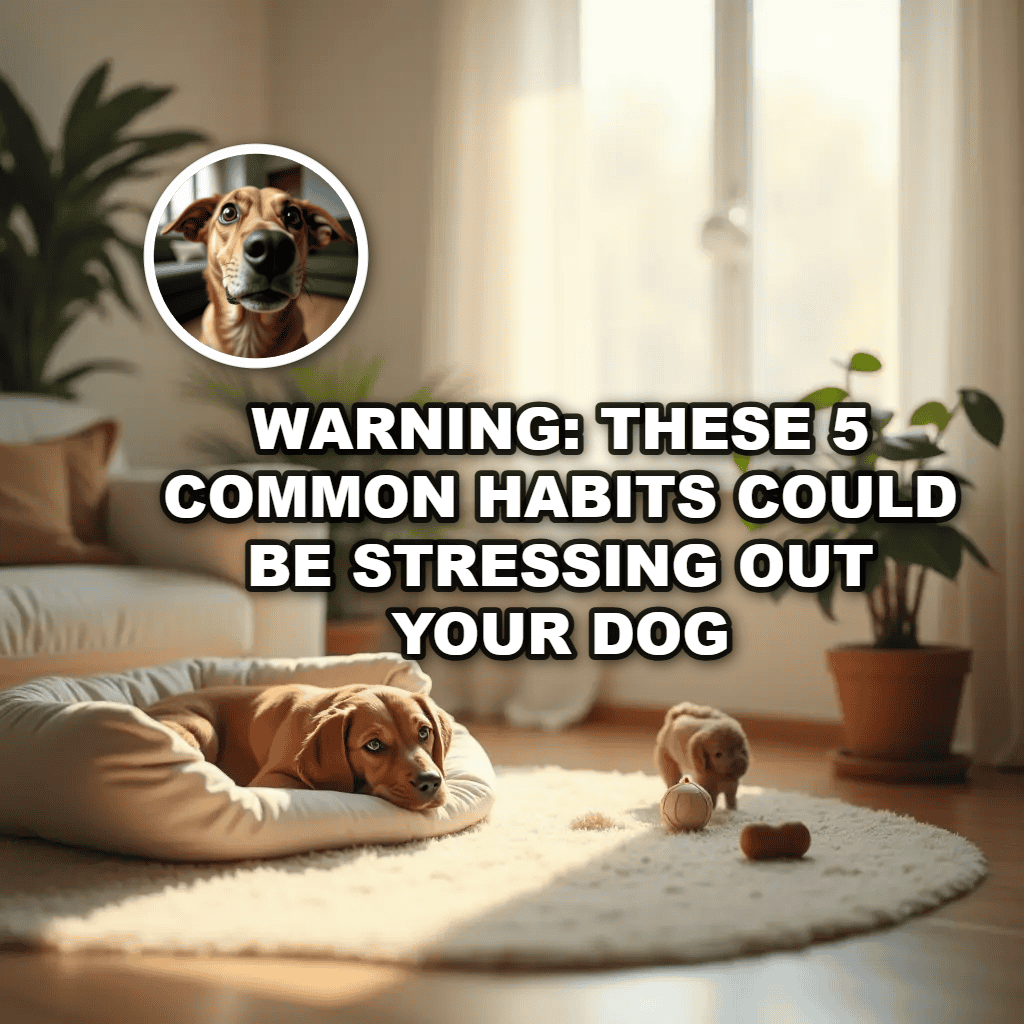Ever wondered if your furry friend could be quietly pleading for some stress relief? In the bustling dance of daily life, we might unknowingly adopt habits that end up stressing our pups without even realizing it. Imagine Doris, your ever-loyal golden retriever, seems more restless lately. Could it be that the very cuddles and routines we cherish secretly stir their anxiety? Stick with me here, I’m about to unlock the mystery of five shockingly common habits that could be taxing on your pup’s mental peace. You won’t want to miss this—your dog’s serenity could be at stake.
Habit 1: Inconsistent Routines
We all love a surprise, but when it comes to your dog, routines are the bread and butter of their happiness. Consistency in their walks, mealtimes, and bedtime signals security, much like a steady heartbeat. Imagine if breakfast and walks feel like a lottery—you might see it as variety, but for them, it’s anxiety-packed chaos. Those big puppy eyes all tear-soaked? That’s because they’re craving predictability in their world.
The stability that a routine provides grounds them and ensures they know what to expect. It helps manage their internal clock, reduces anxiety, and even prevents irritability. Adding structure to their day is not about rigidity, it’s about predictability—without which even something as simple as a delayed dinner can feel like a major hiccup in their world.
So, let’s consider how we can actually stick to a consistent schedule. Maybe it’s as simple as setting daily reminders for walks and feed times. Or, ensuring you have someone to cover for you when work runs late. Trust me, in your absenteeism, the clock is your ally, and your dog will thank you with wagging tails and slobbery kisses.
Habit 2: Unintended Neglect
Life can be an endless to-do list, and sometimes, our four-legged friends find themselves waiting just a tad too long. But hold on—neglect, intended or not, can leave a serious mark on your dog’s mental health, akin to a cloud obscuring the sun on a summer’s day. Pets thrive on interaction, and believe it or not, missing that game of fetch or skipping those cuddles might be more significant than you’d think.
Your dog isn’t just a pet; they help lower your stress, and they too need your companionship to feel secure. Picture this: a dog left alone for long periods may fall into patterns of destructive behavior, trying to cope with the melancholy of your absence. Loneliness is not just a human emotion—it’s alive and kicking in the canine world too.
The good news? Focused attention goes a long way! Whether it’s taking an extra few minutes to rub their belly after a long day or ensuring you spend dedicated time interacting with them, even on your busiest days. Create a balanced schedule that keeps them in the thick of your daily life. They’ll adore every moment of your shared time—and so will you.
Habit 3: Loud Environments
Loud noises might be background buzz for us, but they can be sheer thunder to your dog. Think of fireworks, loud TV shows, or household appliances roaring away—it’s an aural assault on their sensitive ears. Imagine this: a world where every passing truck is an earthquake and every hairdryer is a roaring inferno. Not the most comforting world, is it?
While a bit of noise is inescapable, understanding that your home’s acoustic landscape can secretly stress your pup is half the solution. You might find them trembling under the couch or barking excessively—it’s their way of saying enough!
Creating a serene soundscape is simpler than you think. Try noise-canceling curtains or play calming music designed for dogs to counteract the chaos. Offering a safe silence sanctuary, perhaps a cozy, noise-free corner, can be invaluable for those particularly nerve-racking sounds like storms or Fourth of July festivities. Your dog, with their comforted, relaxed demeanor, will show you their gratitude in wags and nuzzles.
Habit 4: Lack of Physical Exercise
For dogs, exercise is not just about keeping them fit—it’s an outlet for energy, a stress-buster. Imagine feeling cooped up with boundless energy with no way to unleash it; sounds frustrating, right? That’s how your dog feels when daily runs become an occasional stroll around the block.
Exercise is the key to unleashing their behavioral potential. Without it, boredom spirals into anxiety and pent-up energy becomes mischief. A tired dog is a happy dog, and regular exercise smooths out behavioral wrinkles and stress alike.
Take it from my own experience; doubling my pup Charlie’s playtime turned him from Mr. Fidget to a calm cuddle buddy. Tailored games or fetch in the park brings out the glee in them. So, grab your sneakers, lace up, and watch as your dog transforms from a restless pup to a satisfied companion. You’re only a frisbee’s throw away from their wagging approval!
Habit 5: Lack of Mental Stimulation
A sharp mind equals a happy dog. While physical play is essential, keeping your dog’s brain engaged works wonders for their well-being. If you’ve ever seen your dog express the sheer joy of learning a new trick, you know exactly the delight I’m talking about.
Mental exercise dissipates stress and channels their energy in enriching ways. Consider toys that reward puzzles, interactive play, or teaching new commands to spark their curiosity. These aren’t just games—they are bonding moments that nurture a tailored mind-body balance.
My dog, Baxter, brightened up faster than I could say ‘fetch’ when I introduced him to interactive toys. The trick isn’t just giving them a challenge; it’s being part of the challenge. They learn, they grow, and they love you all the more for the time shared. Unleash their full potential with mental stimulation, and watch their happiness unfold.



